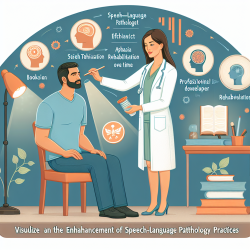In the rapidly evolving field of speech-language pathology, professionals continuously seek effective strategies to enhance therapy outcomes for individuals with communication disorders. Two pivotal resources, "Foundations of Aphasia Rehabilitation" (1993) and "Does Speech and Language Therapy Work? A Review of the Literature" (1995), provide invaluable insights into the efficacy of speech and language therapy and the theoretical underpinnings of aphasia rehabilitation. This blog post aims to explore how practitioners can implement the outcomes of the research presented in these resources to improve their skills and encourage further research.
Understanding the Efficacy of Speech and Language Therapy
"Does Speech and Language Therapy Work?" by Pam Enderby and Joyce Emerson, presents a critical analysis of international research on speech and language treatment methods. The book reviews efficacy studies across various disorders, including aphasia, dysarthria, and stuttering, among others. A key takeaway for practitioners is the importance of evidence-based practice. The authors highlight that the evidence of efficacy in treatment methods is often inconclusive, primarily due to poorly defined measurement objectives in efficacy studies. This finding underscores the need for speech-language pathologists to develop both quantitative and qualitative outcome measures and to determine the most effective and efficient management strategies for speech and language disorders.
Theoretical Foundations of Aphasia Rehabilitation
"Foundations of Aphasia Rehabilitation," edited by Michel Paradis, is a collection of papers that delve into the theoretical foundations of language rehabilitation. This resource serves as a comprehensive guide for understanding the rationale behind various speech therapy interventions over the past decades. For practitioners working with aphasic patients, whether in research or clinical capacities, this book is a treasure trove of information. It covers classification and assessment of rehabilitation methods, their linguistic, cognitive, and neurological foundations, and special populations within aphasia rehabilitation.
Implementing Insights into Practice
To enhance therapy outcomes, practitioners can draw on several key insights from these resources:
- Evidence-Based Practice: Embrace evidence-based approaches by staying informed about the latest research findings. Use the conclusions and recommendations from "Does Speech and Language Therapy Work?" to guide treatment planning and intervention strategies.
- Customized Therapy Plans: Given the variability in efficacy among different therapy approaches for various disorders, as discussed in both resources, practitioners should tailor therapy plans to the individual needs of their clients. This involves thorough assessments and the integration of evidence-based practices that align with the client's specific challenges and goals.
- Outcome Measurement: Develop and utilize both quantitative and qualitative outcome measures to assess the effectiveness of therapy interventions. This aligns with the critique of efficacy studies highlighted in Enderby and Emerson's book, encouraging practitioners to contribute to a more robust evidence base for speech-language pathology practices.
- Continued Professional Development: Engage in lifelong learning by exploring further research in the field. "Foundations of Aphasia Rehabilitation" not only provides an overview of the theoretical bases of current practices but also argues for better research on aphasia rehabilitation. Practitioners should consider becoming "practitioner-researchers," using research methodology in their work to select appropriate treatment strategies and contribute to the field's knowledge base.
- Interdisciplinary Collaboration: Recognize the importance of interdisciplinary collaboration in enhancing therapy outcomes. The complex nature of communication disorders often requires a holistic approach, integrating insights from linguistics, neurology, psychology, and other related fields.
By implementing these insights into practice, speech-language pathologists can enhance the efficacy of their interventions and contribute to the ongoing development of the field. It is through the integration of evidence-based practices, continuous professional development, and interdisciplinary collaboration that practitioners can truly make a difference in the lives of those with communication disorders.
For those interested in delving deeper into the research and theoretical foundations discussed in this blog post, I highly recommend exploring the original resources. To read the original research paper on "Foundations of Aphasia Rehabilitation (1993)," please follow this link.










